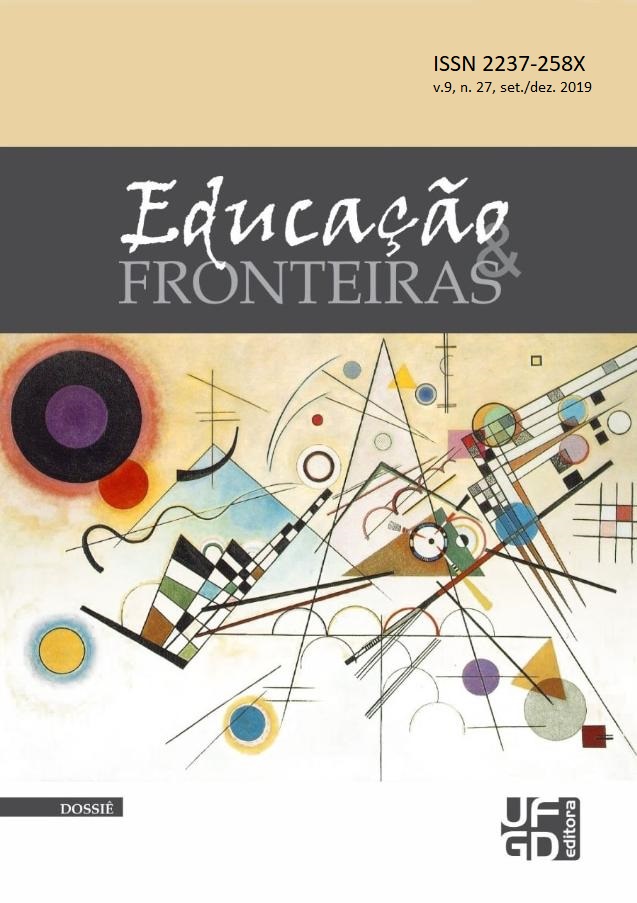Beyond a curricular program: the aesthetic education of pre-school and primary school teachers
DOI:
https://doi.org/10.30612/eduf.v9i27.12609Keywords:
Aesthetic Education. Art. Teachers’ Narratives.Abstract
The intercultural dimensions involved in the teaching profession require that one do not neglect the aesthetic dimensions in the teachers’ training courses, recognizing the need for learning in the field of expressive languages, both personally and professionally. The article discusses data from a research aimed to analyse the presence of the aesthetic and cultural dimensions in the curricula of earlychildhood teacher education and in the student/teachers’ trajectories in initial training at the University of Évora. The theoretical-methodological framework of the study rests in the interface between education, culture and art.The realization of workshops-meetings with students-teachers configured as a space-time to weave memories and narratives about aesthetic developmentaltrajectories. The exercise of recalling situations key to their own education of sensibility, mediated by the contact with multiple languages throughout the workshop-meetings, projected narratives that allowed us to identify key elements of the processes of aesthetic education throughout life and, with them, to reflect that teacher training courses should guarantee space-time for experimentation, expression, creation. In addition to isolated art classes, the importance of cultivating sensitivity and thought articulately, memory and new experiences in contact with nature, culture and art, was endorsed.Downloads
References
ALBANO, A. A. O espaço do desenho: a educação do educador. 9. ed. São Paulo: Loyola, 2002.
BEZELGA, I. Brincar, fruir, experimentar! A presença das artes na formação em educação da Universidade de Évora. Poiésis, Unisul, Tubarão, v. 12, n. 21, p. 167-184, jan./jun. 2018.
DELORY-MOMBERGER, C. Formação e socialização: os ateliês biográficos de projeto. Educação e Pesquisa, São Paulo, v. 32, n. 2, p. 359-371, mai./ago. 2006.
DUARTE Jr., J. F. O sentido dos sentidos: a educação (do) sensível. Curitiba: Criar, 2001.
FOLQUE, M. A. A formação de educadores de infância: da exigência e complexidade da profissão ao projeto de formação na UniverCidade de Évora. Poiésis, Unisul, Tubarão, v. 12, n. 21, p. 32-56, jan./jun. 2018.
FOLQUE, M. A.; LEAL DA COSTA, C.; ARTUR, A. A formação inicial e o desenvolvimento profissional de educadores/professores monodocentes: os desafios do isomorfismo pedagógico. In: CORRÊA, C. H. A.; CALVANCANTI, L. I. P.; BISSOLI, M. F. Formação de professores em perspectiva. Manaus: EDUA, 2016. p. 177-235.
FOX, M. Guilherme Augusto Araújo Fernandes. São Paulo: Brinque Book, 1995.
FREIRE, P. Pedagogia da autonomia. Saberes necessários à prática educativa. 30. ed. São Paulo: Paz e Terra, 2004.
GALEFFI, D. A. Educação estética como atitude sensível transdisciplinar: o aprender a ser o que se é propriamente Em Aberto, Brasília, v. 21, n. 77, p. 97-111, jun. 2007.
HILLMAN, J. Cidade e alma. São Paulo: Studio Nobel, 1993.
HERMANN, N. Ética e estética: a relação quase esquecida. Porto Alegre: EDIPUCRS, 2005.
HERMANN, N. A abertura ao outro. In: HERMANN, Nadja. (Org.). Ética e Educação: outra sensibilidade. Belo Horizonte: Autêntica, 2014.p. 121-151.
LEITE, M. I.; OSTETTO, L. E. In: OSTETTO, L. E.; LEITE, M. I. Arte, infância e formação de professores. Campinas, SP: Papirus, 2004.
NIZA, S. Contextos cooperativos e aprendizagem profissional: a formação no Movimento da Escola Moderna. In: FORMOSINHO, João (Org.). Formação de professores: aprendizagem profissional e ação docente. Porto: Porto Editora, 2009. p. 345-362.
NÓVOA, A. Os professores e as histórias da sua vida. In: NÓVOA, A. (Org.). Vidas de professores. Porto: Porto Editora, 2007. 2. ed. p.11-30.
NUSSBAUM, M. Sem fins lucrativos: por que a democracia precisa das humanidades. São Paulo: Martins Fontes, 2015.
OSTETTO, L. E. Observação, registro, documentação: nomear e significar experiências. In: OSTETTO, L. E. (Org.). Educação infantil: saberes e fazeres da formação de professores. Campinas: Papirus, 2008, p.13-32.
OSTETTO, L.E. Ser professor de educação infantil entre buscas além dos hábitos de pensar e fazer. In: PINHO, S. Z. de (Org.). Formação de educadores: dilemas contemporâneos. São Paulo: Editora Unesp, 2011. p. 155-167.
OSTETTO, L. E. Fazer à mão para falar de si: a dimensão estética na formação e nas narrativas de professores. In: MONTEIRO, F. de A.; NACARATO, A. M.; FONTOURA, H. A. da. (Orgs.) Narrativas docentes, memórias e formação. Curitiba-PR : CRV, 2016, v.1.p. 143-159.
OSTETTO, L. E.; BERNARDES, R. K. Modos de falar de si: a dimensão estética nas narrativas autobiográficas. Pró-Posições (UNICAMP. Impresso), v.26, p.161 -178, 2015.
OSTETTO, L. E.; SILVA, G.D. de B. Formação docente, Educação Infantil e arte: entre faltas, necessidades e desejos. Revista Educação e Cultura Contemporânea, v. 15, n. 41, p. 260-287, 2018.
PERISSÉ, G. Estética e educação. Belo Horizonte: Autêntica, 2009.
QUEIRÓS, B. C. de. Os cinco sentidos. São Paulo: Global, 2009.
RINALDI, C. Diálogos com Reggio Emilia; escutar, investigar e aprender. São Paulo: Paze Terra, 2012.
SILVEIRA, P. A página violada: da ternura à injúria na construção do livro de artista. Porto Alegre: UFRGS, 2001.
VECCHI, V. Artey creatividad en Reggio Emilia; el papel de los talleres y sus possibilidades en educación infantil. Madrid: Ediciones Morata, 2013.
WARSCHAUER, C. A roda e o registro: uma parceria entre professor, alunos e conhecimento. Rio de Janeiro: Paz e Terra,1993.









